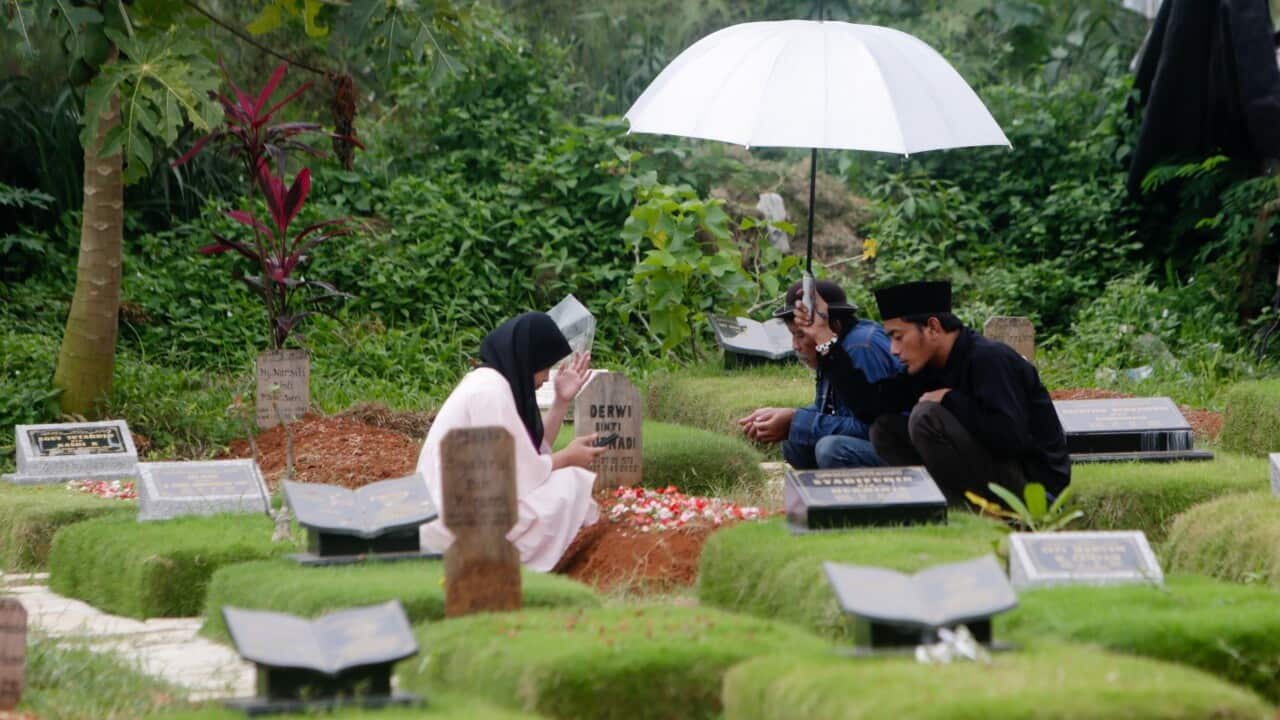Key Points
- The tradition of visiting graves in Indonesia sets its Islamic observance form apart from other branches of the faith.
- Families use the visits as a way to pay their respects to those who have died.
- The visits can also involve cleaning and tidying grave sites.
Indonesia has the largest Muslim population in the world with about 231 million or 86.7 per cent of the entire population identifying as Muslim.
Therefore, Ramadan and Eid al-Fitr are observances that Indonesian Muslims look forward to - not only as a moment to strengthen faith and morality, but also as a moment to get closer to family.
Many activities are carried out such as suhoor with family, iftar with friends or colleagues, and night prayers in congregation.
Families also make a pilgrimage to the graves of loved ones during Ramadan and in the lead-up to Eid al-Fitr.
In Indonesia, Ramadan is not an individual worship, but congregational. Suhoor with family, iftar and worship together, and others. So, there is a feeling of loss when our family or parents are gone.Nadirsyah Hosen, Law Lecturer from Monash University
The tradition of visiting graves in Indonesia
Achmad Munjid, from the Mardliyyah Islamic Centre, Gajah Mada University, Indonesia, said the tradition of visiting graves in Indonesia was carried out before Islam arrived in the country.
When Islam entered Indonesia, the tradition was maintained but the practice was influenced and determined by Islamic guidance, he said.
Istiari Widodo, from the Indonesian Muslim Community of Victoria, said that the implementation of religious knowledge could not be separated from local cultures which played an important role in shaping sociological patterns of society.
In different areas, these visiting activities had their own names and processes, he said.
For example, he said that in the West Java region, it was called Munggahan while in Jogjakarta, the tradition of visiting cemeteries was known as Ruwahan, and in Javanese society as Nyadran.
In Nyadran, apart from visiting the tombs, this tradition is also filled with mutual cooperation in cleaning the tombs and eating together at the mosque or the village head's residence.

Indonesian villagers carry traditional food containers called 'tenongan' as they visit a cemetery of their ancestors during the 'Nyadran' celebrations ahead of Ramadan in Cepogo, Boyolali, Central Java, Indonesia, 08 May 2018. Source: EPA / ALI LUTFI/EPA/AAP Image
Why visit a cemetery?
Mr Munjid said people visited cemeteries to pray for their family members who had died.
He also explained that visiting family graves also aimed to preserve family histories. The more the pilgrimage tradition was maintained, the more ancestors understood their family trees, he said.

A family in Indonesia visiting the grave of a loved one. Source: Supplied / Dilail Abimanyu
Why is this a good tradition?
Monash University law lecturer, Nadirsyah Hosen, said he viewed the tradition of visiting graves in Indonesia as a good tradition, because this activity could remind people of death.
Visiting cemeteries is also a reminder of the afterlife. So, when we make visit, we'll see what the end of our life will be like.Istiari Widodo, Indonesian Muslim Community of Victoria
He also said he noticed that in other cultures, family members did not make regular visit to the graves of their loved ones so these were often unkempt and overgrown with weeds.
He said with this in mind,visiting family graves during Ramadan or Eid al-Fitr sometimes also provided an opportunity to clean the graves and send prayers for those who had died.
Mr Munjid said that visiting cemeteries was a form of horizontal relationship between humans which complemented the vertical relationship between humans and God.
Listen to every Monday, Wednesday, Friday and Sunday at 3pm. Follow us on and catch up with us on .

